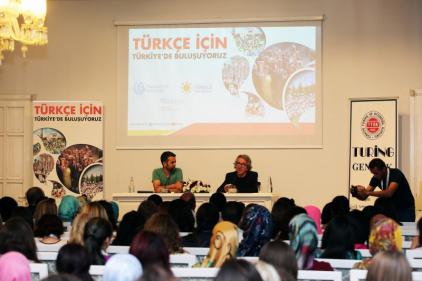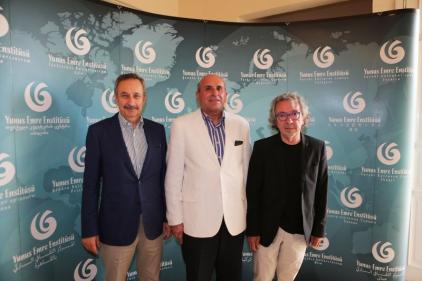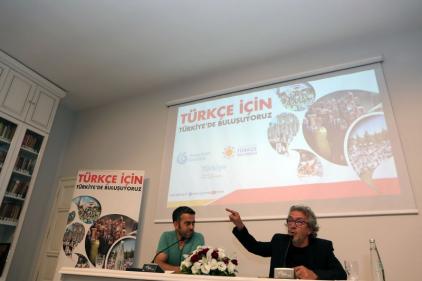Osman Sınav met with International Turcology Summer School students
Yunus Emre Institute brings students who set their hearts on Turkish language, and wish to study Turkish culture and history to build a career from all corners of the world to Turkey as part of Turkish Language Summer Course organized since 2010. On 31 July, Friday youth who received training in 2015 International Turcology Summer School and admire Turkish language and movies came together with Osman Sınav, the director and producer of cult series and movies that marked an era such as Valley of the Wolves, Bitter Life, Bread and Butter, Long Story.
“Artist does not take a side, and should remain in limbo”
Osman Sınav shared his experience on cinema, TV series industry, screenwriting in the event. Sınav said, “'Long Story' in fact became a Yunus Emre Institute movie because we visited Jordan, Tehran, Poland, Bosnia and Herzegovina, Macedonia, Kazakhstan and many other countries with the Institute. Yunus Emre Enstitüsü is a major cultural movement in the history of Turkish Republic.” Acclaimed director continued as follows: “I would like to say a few things about the foundation of reality. In philosophy, what we call reality is a verbal structure. However in cinema, reality is built visually. God forges the link here, and creates an image using words as is the case in holy scriptures. Because images are not obtained exclusively from cameras; one may create an image using words as well and in order to construct reality, one ought to make a dramatic interpretation since you cannot make art but science with information. What creates modern perception is dramatic interpretation, and we must do that to expand our minds and deepen our understanding. Artist should remain in limbo. If artist abstains from dramatic interpretation, then he/she cannot remain in limbo and eventually chooses a side. However artist is obliged to see both sides. 'Long Story' was a special movie for me in this respect. It is a pursuit, an emigration movie with a 'dramatic interpretation' subtext. For us, pursuit means to proceed towards a truer, more just place both morally and materially. This is why the protagonist in the movie, Ali travels to many different places; it is an outcome of this pursuit.”
“Cinema is a universal language”
Yunus Emre Enstitüsü Vice President Dr. Şaban Çobanoğlu mentioned the following in his speech regarding the language of cinema: “Cinema is a universal language. Philologists and Turcologists investigate the inner world of individuals and outer reality. Cinema captures such a language to represent the connection between the inner world and outer reality. Art is a whole with all its branches, and it is difficult to separate those. Camera, director, writer, man of letters have a language in cinema and a reader interpreting this language is present. This is what a writer and artist should keep in mind.” Çobanoğlu remarked their efforts to unravel obscure diplomacy languages as an Institute, and added, “We wish to exhibit our languages and interpret it as part of a rich blend. Boundaries of the countries are protected by unity of cultures and languages, not by guns and rifles.”
Event ended following a question and answer session with students.






